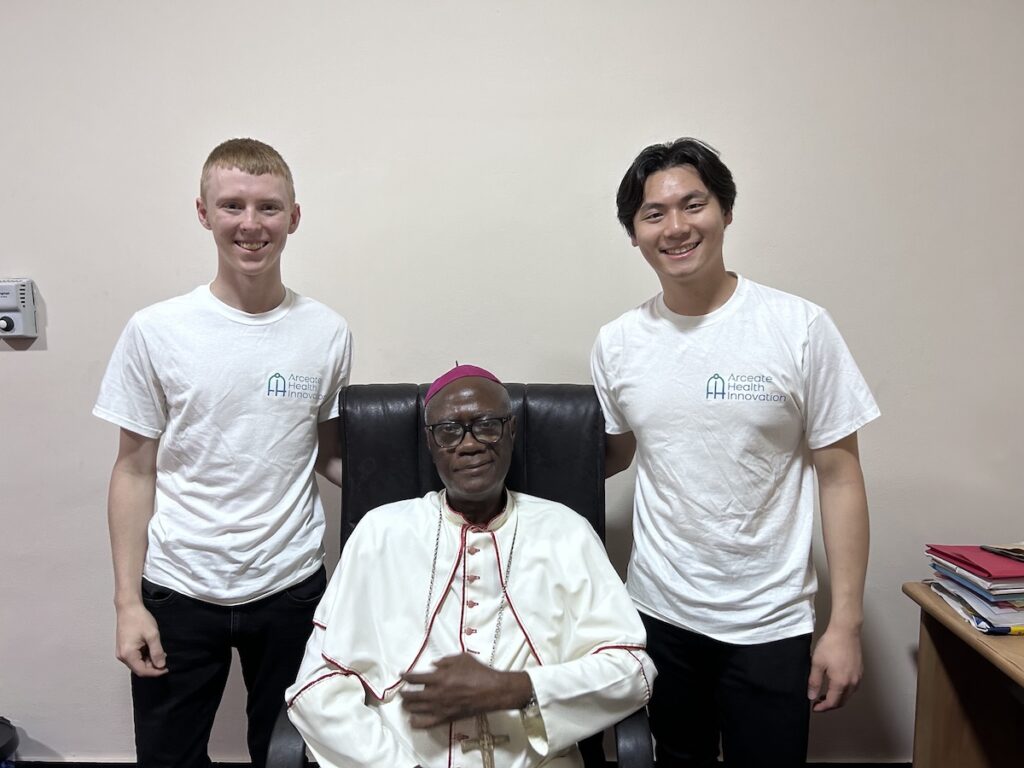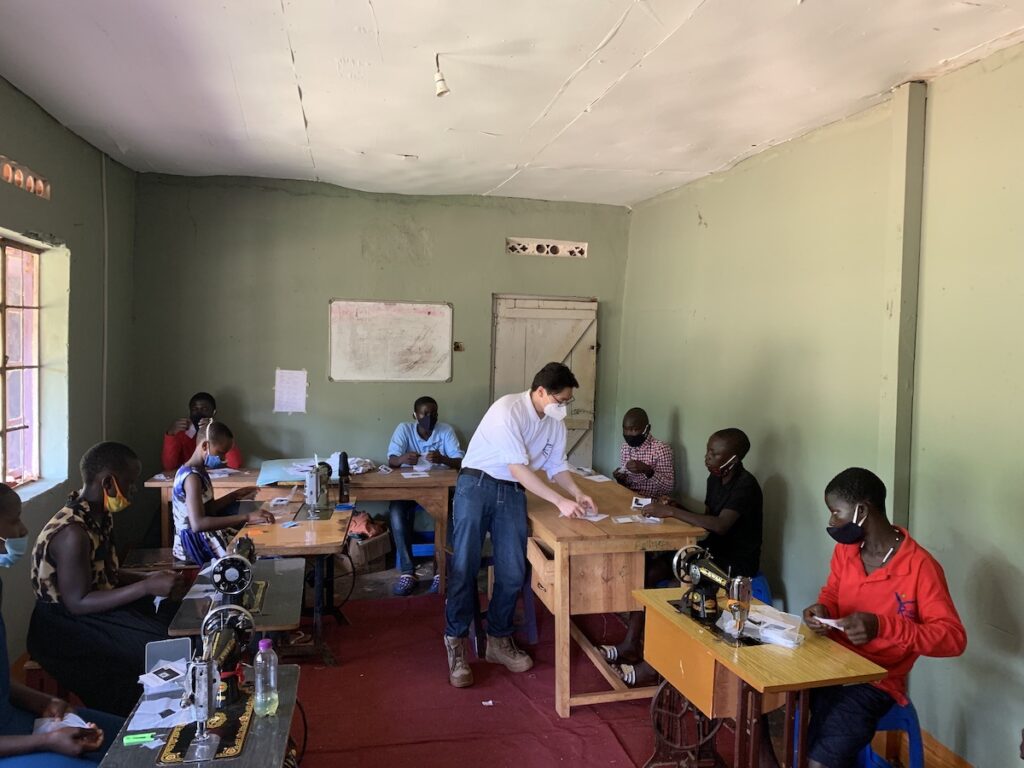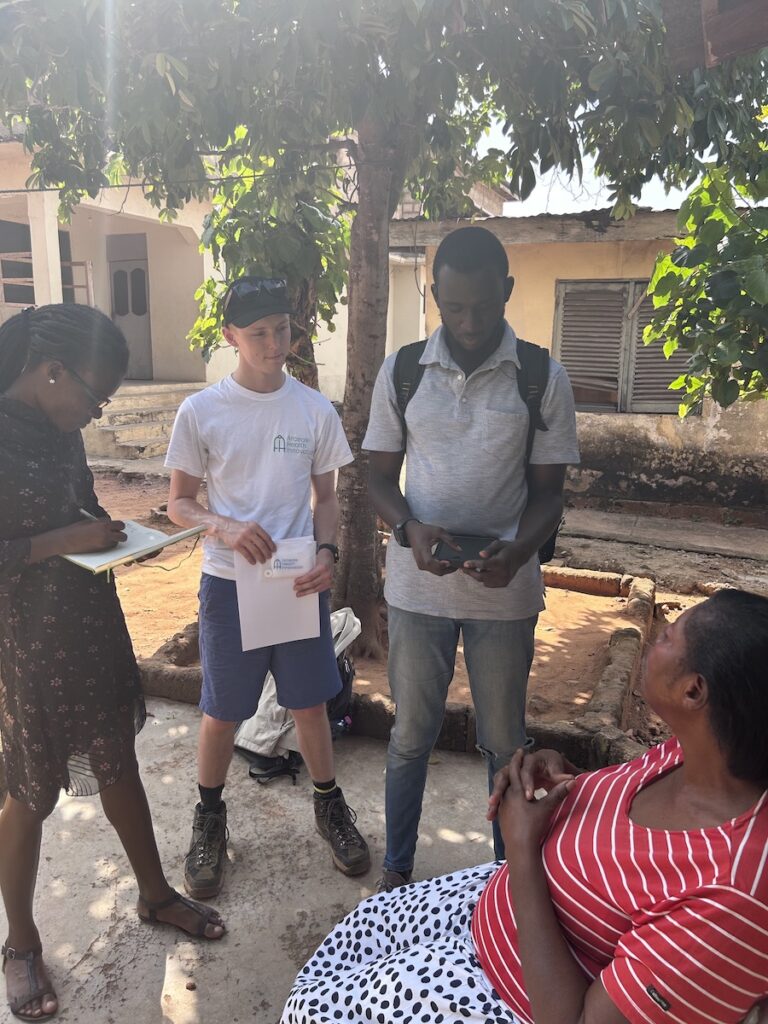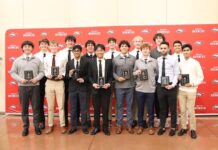
(Courtesy Photo)
Trips to Ghana, Uganda help battle deadly disease
By Joyce Coronel, The Catholic Sun
TEMPE — Two Arizona State University students will soon be headed to Africa to distribute a low-cost mosquito net repair kit they’ve developed to help stop the spread of malaria.
Ben Voller-Brown, who is studying mechanical engineering, and Michael Li, a student of biomedical engineering, are passionate about helping to eradicate a deadly disease that infected 241 million people in 2021 and killed 627,000, nearly 80 percent of whom were children.
This won’t be the first time the ASU duo has ventured to Africa. Their initial trip was during the summer of 2021 when they travelled to Uganda. There, they met Kojo, a 12-year-old boy impacted by malaria. The small village the family inhabits is a high-risk area for the disease.
Kojo’s family is poor and lives in a small hut with a thatched roof. Even though family members were given insecticide-treated bed nets by their local health clinic, the nets became torn, leaving the family vulnerable as they slept. All of them were bitten by infected mosquitos and contracted malaria. They lay sick for weeks, Kojo’s father unable to work. Kojo couldn’t attend school and when he finally returned, he was still weak and struggled to concentrate.
“Our goal is to get repair kits into every village across the continent, so families like Kojo’s can sleep safely and children can attend school without interruption,” Voller-Brown said.
The idea to create the mosquito net repair kit is something that grew out of a class Voller-Brown was taking. When the course concluded, he and Li, with whom he’d been friends since high school, decided to keep going.
Voller-Brown was driven in part by the experience of seeing his mom diagnosed with multiple myeloma, a cancer that forms in plasma cells and can lead to massive bone damage. He was a freshman in high school when his mom received the diagnosis.
“Her pills would be $10,000 a month to keep the cancer from coming back,” Voller-Brown said. She survived, but the memories of that time linger.

Repair kits prevent tragedy
Fast forward to engineering school alongside his buddy Li: What if they could develop an inexpensive product that would prevent someone from contracting malaria? Could prevent the suffering and death that have ravaged so many lives?
The answer was yes, they could develop it, but it took ingenuity and lots of elbow grease. The kit Li and Voller-Brown engineered comes with all the materials needed to patch a wide variety of tears in mosquito nets. When they visited Uganda, they found that with their simple instructions, even children were able to patch a tear in under 10 minutes. Each kit includes enough patching material to repair more than 20 average-sized holes.
This summer, Li and Voller-Brown will return to Ghana to conduct a large-scale study and distribute 1,500 more kits.
“We are willing to do anything that’s possible to help these people,” Li said. “We don’t care what we need to do, whether it’s research, whether it’s through a product, whether it’s through a non-profit, we would like to do everything in our power to solve such a simple problem because we truly believe this is something that will make a huge impact on millions of lives.”
Turns out that 96 percent of insecticide-treated mosquito nets, used to prevent the mosquito bites which lead to malaria, are torn within the first two years of use. They’re supposed to last for three. About 40 percent of nets are torn within the first nine months, leaving people vulnerable to the bite of infected mosquitos.
High fevers, chills and flu-like symptoms are the first sign that infection has taken hold. Left untreated, the disease can lead to breathing problems, swelling of the brain, organ failure and death.
And it’s all preventable.
Li and Voller-Brown have already shipped thousands of kits across Uganda. So far, 96 percent of people pledged to use their kit to repair their nets when damaged. After just 12 months, 64 percent kept themselves safe from malaria using the kits.

Empowered by faith
Li, who grew up in China and came to the U.S. at age 14, said he feels the mission to Africa is a mandate from God, something He put in Li’s heart so that he could make a difference in the world. It’s a shift from his earlier life.
“When we were in China, Christianity and Catholicism and all of that is kind of persecuted by the government — especially back then, so we didn’t really have much exposure to the faith.”
His grandmother and aunts, who had become Christian in the U.S., visited the family in China and evangelized them.
“When we moved to the States, they started bringing us to church with them on Sundays, and we started really believing in the faith.” The development of the repair kit and journey to Africa solidified his newfound beliefs, he said.
“I truly believe that God has shown me this way, and it is incredibly powerful to me that He has given me this kind of gift. I don’t think I can waste any of it,” Li said.
While in Africa, the pair have stayed at parishes and attended Mass, even though they didn’t understand the language. They say they gained strength and inspiration starting their day in God’s house. From Holy Spirit Cathedral in Accra, Ghana, to the Order of Servants of Mary in Kisoga of Uganda, they’ve been bolstered by the support of the Church.
“They are the people who helped us make all of the progress that we’ve made,” Li said. “Genuinely, what we are doing is literally only possible through God.”
“Without the light of God in my heart and the help of the Catholic community, this project would not have gone anywhere,” Voller-Brown said.
Sun Devil Foundation connection
Paul Mulligan, President and CEO of Catholic Charities Community Services, met Li and Voller-Brown at a Sun Devil 100 luncheon last year that featured a panel of 15 ASU student entrepreneurs. He said he was struck by the simple, elegant, low-tech solution the pair developed.
“But interestingly, while the two of them are very smart individuals, it’s the interplay I’ve seen between their personalities, rooted in deep friendship and mutual respect, that seems to make it all come together,” Mulligan said.
The two young engineers are both only children and often joke they are brothers born to two different mothers. Voller-Brown is learning to speak Mandarin. He loves the food at the Chinese restaurant where Li works.
As graduation day approaches, Voller-Brown and Li are also getting ready to travel to Washington, D.C., where they’ll take part in a summit addressing malaria prevention. They’re in fundraising mode now and in May will return to Africa with more of their life-saving kits.
Contact Michael Li. Contact Ben Voller-Brown.







